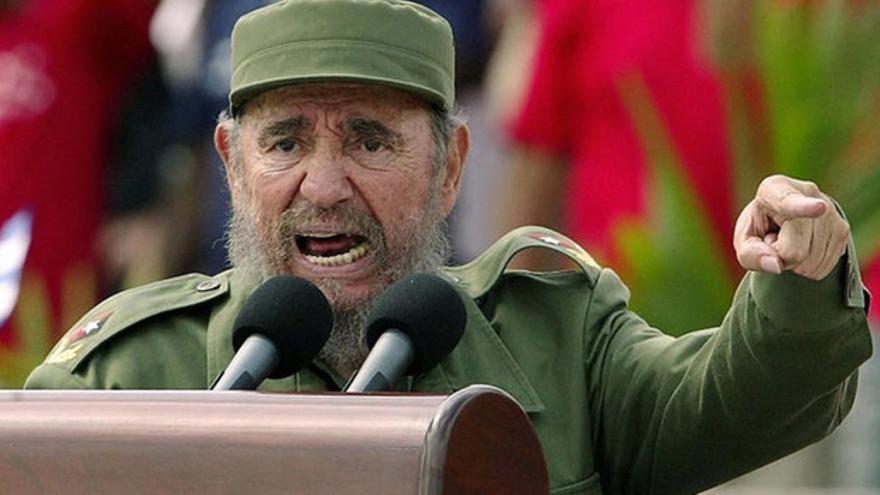
![]() 14ymedio, Pedro Corzo, Miami, 24 July 2022 — Fidel Castro was a legal opportunist. A fundamentalist of power and obviously an unscrupulous subject. His indisputable talent guided him to the conquest of power and its preservation; in both projections he had a resounding success. He was the dean of Latin American dictators and the one who governed the world the longest: 49 years and 8 days, according to a recent exhibition.
14ymedio, Pedro Corzo, Miami, 24 July 2022 — Fidel Castro was a legal opportunist. A fundamentalist of power and obviously an unscrupulous subject. His indisputable talent guided him to the conquest of power and its preservation; in both projections he had a resounding success. He was the dean of Latin American dictators and the one who governed the world the longest: 49 years and 8 days, according to a recent exhibition.
On the other hand, although Castro always tried to present himself as a civilian leader and incessantly attacked the military governments of the hemisphere, which he described as gorilla regimes, he maintained close relations with various uniformed caciques.
One of the first was General Juan Domingo Perón, about whom Castro wrote. “We are very grateful to General Perón, he was the first to recognize us. He sold us those cars that we still have, those Fords that are still around. He sold us wagons for our railroads. We are very grateful to him. We have always been friends of the Peronists. Perón seriously wounded the snake (the US says so) although he did not kill it.”
This was the origin of the more than 2.7 billion that Cuba owes to Argentina and the basis, perhaps, for the close relationship of the Military Junta of that country with the Cuban dictator, despite the fact that the defenders of the Cuban regime in that country accuse the military of thousands of disappeared. Bad memory is everywhere and those who best represented it were the Fernández-Kirchner couple.
Argentina was a target of Castro’s subversion. However, several years ago the secret links that existed between the Argentine Military Junta and the Cuban dictator Fidel Castro were discovered, a relationship that was denied by the supporters of Castroism. In 2003, however, Alfredo Felipe Fuentes, a former political prisoner of Cuba’s Black Spring, published a book [La Falsa Imagen de Fidel Castro (En Colores): Evidencias Irrefutables], which I do not intend to comment on, in which he graphically demonstrates that these relationships existed and were beneficial for both.
The book presents graphic testimonies of the unusual relationship, not exceptional, if we remember the Ribbentrop-Molotov Pact, signed in Moscow seven days before the Nazi invasion of Poland, which resulted in the partition of that country between Berlin and the Kremlin. In other words, the opportunism of the Caribbean leader was inspired by the example of two of his teachers, Joseph Stalin and Adolf Hitler.
Among those blessed by Pope Castro, not to be confused with Francisco, despite his human relationship with the executioner Raúl Castro, was the Peruvian general Juan Velazco Alvarado, who led a military coup against President Fernando Belaunde Terry and established an iron dictatorship that Castro distinguished with his visit, to the extreme that months later a large delegation of high-ranking Peruvian soldiers attended the Cuban military maneuvers called “Ayacucho 150” in which the dictator Castro said, “And in Peru Today, as in Cuba, Yankee imperialism no longer dominates!”
Velazco Alvarado was followed by two Panamanian soldiers, Omar Torrijos and Manuel Antonio Noriega, who for Castro were good dictators due to the close relations he had with both. These rulers, like his mentor, did not hesitate to crush the opposition.
However, the most productive military man for Castroism was Hugo Chávez Frías. The Venezuelan coup leader, affirms journalist Alexis Ortiz, was the bridge of salvation for Cuban totalitarianism when it lost the multimillion-dollar subsidy from the former Soviet Union. The Castro state, sucker by nature, found in Chávez and Venezuela the necessary cornucopia to survive, despite the fact that the Cuban model was already exhausted by that time.
However, in my opinion, the most aberrant relationship was that of the Argentine Military Junta with Castro, as Felipe Fuentes’ book demonstrates. Supposed ideological enemies allied themselves to avoid being condemned in international instances for their systematic violation of human rights but, even more monstrous, is that the relatives of those who attribute thousands of disappeared and murdered to that Military Junta, defend the legacy of Castroism.
____________
COLLABORATE WITH OUR WORK: The 14ymedio team is committed to practicing serious journalism that reflects Cuba’s reality in all its depth. Thank you for joining us on this long journey. We invite you to continue supporting us by becoming a member of 14ymedio now. Together we can continue transforming journalism in Cuba.
